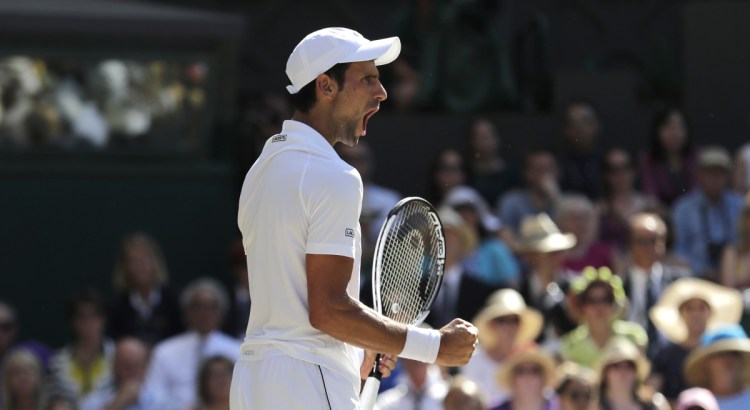LONDON — Novak Djokovic acknowledged that he was worried. His coach was, too.
Could Djokovic ever return to the top of tennis, to the heights he’d already reached? Could he put aside the time lost to a painful right elbow that required surgery, and the disappointment of poor-for-him results? Could he end a Grand Slam drought that lasted more than two years?
All of that fretting seemed misplaced Sunday. Back at his best, Djokovic became Wimbledon’s champion for the fourth time, grabbing a lead right away against a weary Kevin Anderson and holding off a late challenge to win 6-2, 6-2, 7-6 (3).
“There were several moments where I was frustrated and questioning whether I can get back (to the) desired level or not. But that makes this whole journey even more special for me,” Djokovic said.
“It’s easy to talk now and look back at it and be kind of grateful, but I really am grateful to go through this kind of, so to say, mixed emotions, turbulences as well, mentally, moments of doubt and disappointment and frustration, anger.”
It is Djokovic’s 13th major trophy, the fourth-highest total in the history of men’s tennis, trailing only Roger Federer’s 20, Rafael Nadal’s 17 and his childhood idol Pete Sampras’ 14.
But it’s also Djokovic’s first major victory since he completed a career Grand Slam at the 2016 French Open.
“It was a long journey,” the 31-year-old from Serbia said. “I couldn’t pick a better place, to be honest, in the tennis world to peak and to make a comeback.”
A year ago at the All England Club, Djokovic quit during his quarterfinal because of the elbow, then he took the rest of 2017 off.
After the operation in February, Djokovic’s results were mediocre. He realized later he tried to come back too soon.
“I really was impatient,” he says now.
In April, he reunited with Marian Vajda, the man who had coached Djokovic for years before Boris Becker and Andre Agassi did.
They built “the new Novak,” as Vajda explained it, retooling his serve and making adjustments to other strokes.
Still, Djokovic was so dispirited by his upset loss at the French Open last month that he vowed, in the heat of the moment, to skip the grass-court circuit.
Good thing he didn’t stick to that.
Because he fell out of the top 20 for the first time in more than a decade, Djokovic is the lowest-ranked Wimbledon titlist since Goran Ivanisevic in 2001. He was ranked 21st, but now will be back in the top 10.
Under a pale blue sky interrupted by only the occasional soft white puff of cloud, Djokovic looked far more like a guy who used to be No. 1.
“The first two sets, Novak beat up on me pretty bad,” said Anderson.
Anderson could be excused for exhaustion. His semifinal was the second-longest Grand Slam match in history, lasting more than 6 1/2 hours until he edged John Isner 26-24 in the fifth set. And that followed another extended fifth set in his 13-11 upset of eight-time champion Federer in the quarterfinals.
Anderson also blamed some nerves.
This was, after all, the 22nd Grand Slam final for Djokovic but only the second for Anderson, the runner-up at last year’s U.S. Open. Anderson was aiming to become the first South African man to win Wimbledon, but he was so out of sorts, his strokes so off-the-mark, that Djokovic gathered eight of the first 10 games even though he only hit two winners. Anderson made 15 unforced errors in that span.
Anderson raised his game late and nearly extended the match, five times standing just a point away from forcing a fourth set. Djokovic held steady on each one, then was as superior in the tiebreaker as he was most of the afternoon.
Send questions/comments to the editors.



Success. Please wait for the page to reload. If the page does not reload within 5 seconds, please refresh the page.
Enter your email and password to access comments.
Hi, to comment on stories you must . This profile is in addition to your subscription and website login.
Already have a commenting profile? .
Invalid username/password.
Please check your email to confirm and complete your registration.
Only subscribers are eligible to post comments. Please subscribe or login first for digital access. Here’s why.
Use the form below to reset your password. When you've submitted your account email, we will send an email with a reset code.